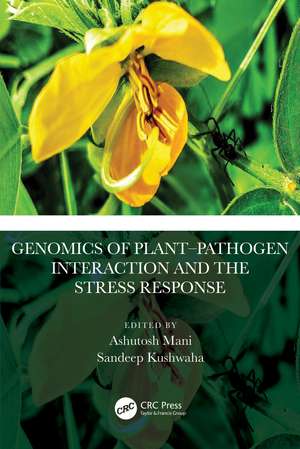Genomics of Plant–Pathogen Interaction and the Stress Response
Editat de Ashutosh Mani, Sandeep Kushwahaen Limba Engleză Hardback – 25 sep 2023
Diseases in plants may be caused by various factors, such as viruses, bacteria, fungi and abiotic stress. Disease causes low crop yield, production of poor-quality fruits and grains, and deficiency of nutrients, which have a direct impact on human and animal health. A genomics-based approach can be applied to disease diagnosis; disease outbreak; evolution of plant and pathogen genome for disease outbreak in relation to climate change; and development of long-term strategies for plant health and defense. This book presents an overview of omics technologies and approaches used to understand:
- the relation between plants and their environment in terms of diseases
- responses to abiotic stress
- the genomics of plant–pathogen interaction
- herbicide-resistance mechanisms
- the epigenetics of plant–pathogen interaction
- gene regulation during abiotic stress response
- the oxidative stress response
Preț: 654.96 lei
Preț vechi: 953.27 lei
-31% Nou
Puncte Express: 982
Preț estimativ în valută:
125.35€ • 130.52$ • 105.93£
125.35€ • 130.52$ • 105.93£
Carte tipărită la comandă
Livrare economică 10-24 martie
Preluare comenzi: 021 569.72.76
Specificații
ISBN-13: 9780367721084
ISBN-10: 0367721082
Pagini: 220
Ilustrații: 54
Dimensiuni: 152 x 229 mm
Greutate: 0.57 kg
Ediția:1
Editura: CRC Press
Colecția CRC Press
ISBN-10: 0367721082
Pagini: 220
Ilustrații: 54
Dimensiuni: 152 x 229 mm
Greutate: 0.57 kg
Ediția:1
Editura: CRC Press
Colecția CRC Press
Public țintă
Postgraduate and ProfessionalCuprins
Chapter 1: Integrative Omics: Trends and Scope for Agriculture
Chapter 2: An Overview of Plant–Pathogen Genome Databases and Interaction Resources
Chapter 3: Exploring the Herbicide Resistance Mechanisms in Weeds Using Omics Technologies
Chapter 4: Impact of Genomics in Improvement of Rice Bean Production and Productivity: An Orphan Crop
Chapter 5: Omics Technologies Unravelling the Plant–Pathogen Interaction and Stress Response
Chapter 6: Meta-Analysis of Arabidopsis thaliana Gene Expression Data Identifies Heavy Metal Stress Responsive Genes
Chapter 7: Impact of Genomics Tools and Techniques in Crop Improvement
Chapter 8: Epigenetic Response During Plant–Pathogenic Interaction: An Overview
Chapter 9: Gene Regulation for Drought, Cold, Heavy Metal and Environmental Responses
Chapter 10: Role of Oxidative Stress-Responsive Thioredoxins in Biotic and Abiotic Stress Responses in Plants
Chapter 2: An Overview of Plant–Pathogen Genome Databases and Interaction Resources
Chapter 3: Exploring the Herbicide Resistance Mechanisms in Weeds Using Omics Technologies
Chapter 4: Impact of Genomics in Improvement of Rice Bean Production and Productivity: An Orphan Crop
Chapter 5: Omics Technologies Unravelling the Plant–Pathogen Interaction and Stress Response
Chapter 6: Meta-Analysis of Arabidopsis thaliana Gene Expression Data Identifies Heavy Metal Stress Responsive Genes
Chapter 7: Impact of Genomics Tools and Techniques in Crop Improvement
Chapter 8: Epigenetic Response During Plant–Pathogenic Interaction: An Overview
Chapter 9: Gene Regulation for Drought, Cold, Heavy Metal and Environmental Responses
Chapter 10: Role of Oxidative Stress-Responsive Thioredoxins in Biotic and Abiotic Stress Responses in Plants
Notă biografică
Dr Ashutosh Mani holds an MSc and PhD in Bioinformatics from the University of Allahabad, India. He worked as a MIUR fellow at the University of Cagliari, Italy, and is currently an assistant professor at Motilal Nehru National Institute of Technology Allahabad, India. He has more than ten years of teaching and research experience in molecular and structural biology, genomics and computational biology. His areas of interest include herbal drug discovery against Alzheimer's disease and diabetes and plant stress tolerance. Dr Mani has published more than 50 articles in national and international journals of repute. He has supervised 5 PhD, 10 MTech and 23 BTech Students. He has completed four sponsored research projects and has received research grants from funding agencies such as DST, SERB, ICMR and DBT.
Dr Sandeep Kushwaha started his research career as a doctoral student at the Department of Bioinformatics, Maulana Azad National Institute of Technology, Bhopal. During his stay at Lund University and the Swedish University of Agricultural Sciences, he worked on more than ten major scientific projects in plant and soil science, elucidating molecular and genetic mechanisms and plant interaction using omics data and bioinformatics tools and techniques. He works as Scientist-E at the National Institute of Animal Biotechnology, Hyderabad, India. He has completed various research projects, published research articles in the public domain, and taught various higher education courses in India as well as abroad.
Dr Sandeep Kushwaha started his research career as a doctoral student at the Department of Bioinformatics, Maulana Azad National Institute of Technology, Bhopal. During his stay at Lund University and the Swedish University of Agricultural Sciences, he worked on more than ten major scientific projects in plant and soil science, elucidating molecular and genetic mechanisms and plant interaction using omics data and bioinformatics tools and techniques. He works as Scientist-E at the National Institute of Animal Biotechnology, Hyderabad, India. He has completed various research projects, published research articles in the public domain, and taught various higher education courses in India as well as abroad.
Descriere
Genomics based approached can be used for disease diagnosis, disease outbreak, evolution of plant and pathogen genome for disease outbreak in relation to climate change, and be helpful in development of long-term strategies for plant health and defence.
